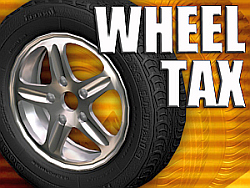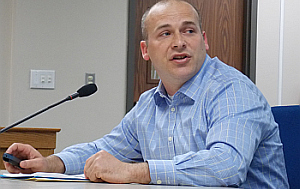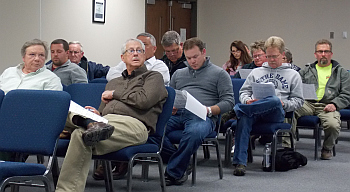April 23, 2015
 Wednesday evening members of the Marshall County Commissioners and County Council met in a special joint meeting to receive information on Indiana’s Local Option Highway User Tax more commonly referred to as LOHUT.
Wednesday evening members of the Marshall County Commissioners and County Council met in a special joint meeting to receive information on Indiana’s Local Option Highway User Tax more commonly referred to as LOHUT.
 Patrick Conner from Indiana’s Local Technical Assistance Program also called LTAP from Purdue explained what a LOHUT was. Indiana legislature approved the implementation of the tax in 1980 and now 50 of the 92 counties in Indiana have put the tax in place. LOHUT is a combination of a vehicle excise surtax and a county wheel tax.
Patrick Conner from Indiana’s Local Technical Assistance Program also called LTAP from Purdue explained what a LOHUT was. Indiana legislature approved the implementation of the tax in 1980 and now 50 of the 92 counties in Indiana have put the tax in place. LOHUT is a combination of a vehicle excise surtax and a county wheel tax.
The excise surtax applies to mopeds, motorcycles, automobiles and trucks less than 11,000 pounds. The excise tax can be either a percentage of the excise tax of 2% up to 10% or a flat amount of $7.50 up to $25.00. The rate would be the same on all vehicles in this category.
 The county wheel tax is a tax per registration and not per wheel. I would include; busses, RV’s, semi-tractors and semi-trailers, tractors, trailers, and trucks over 11,000 pounds. The rate can range from $5.00 up to $40 per vehicle and can vary with the vehicles in this category.
The county wheel tax is a tax per registration and not per wheel. I would include; busses, RV’s, semi-tractors and semi-trailers, tractors, trailers, and trucks over 11,000 pounds. The rate can range from $5.00 up to $40 per vehicle and can vary with the vehicles in this category.
There are exemptions to the LOHUT; state, county or city owned vehicles and non-profits.
Conner presented figures for Marshall County that show implementing the two taxes, the excise surtax and the county wheel tax. Using the numbers from 2014, there were 45,201 registered vehicles in Marshall County. Looking at the low end and high end of the percentage for the Excise Surtax would create $309,120 up to $408,091. I the flat fee would be selected the tax would raise $332,227 on the low end up to $1,123,244 on the high end.
The County Wheel Tax would generate between $49,988 and $410,733 each year depending on the rate chosen between $5 and $40.
Adding all the numbers together would raise between $382,216 and $1,395,289. The tax would be collected by the Bureau of Motor Vehicles when you plate your vehicle and they would take $.15 per transaction. The tax would be shared with the municipalities within the county based on population and road miles. It was estimated that Argos would receive between $10,225 and $41,000 while Bourbon would see $15,000 up to $61,000. Other communities like Bremen would get $28,000 up to $115,000 and Plymouth’s share would range from $66,000 up to $242,000.
About 30 citizens attended the meeting, many of whom are involved in the administration of their city or towns.
Commissioner President, Kevin Overmyer thanked Conner for coming to the special joint meeting and said, “We are just gathering information. You have given up plenty to think about.” He indicated that both the County Council, the ones who would actually approve implementation of the LOHUT and the Commissioners will be discussing the information at their next meetings.